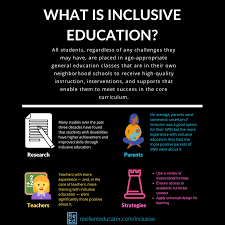Introduction
In recent decades, inclusive education has become an essential component of education systems worldwide. This approach, which is centered around the idea that all children, regardless of their abilities and backgrounds, should have equal opportunities to learn in mainstream schools. However, the implementation and effectiveness of inclusive education policies have been called into question. This article aims to shed light on the need for a major review of national policies on inclusive education in order to promote a more equitable and effective educational experience for all.
The Need for Inclusive Education Policy Review
There are several reasons why a comprehensive evaluation of inclusive education policies is necessary at this moment.
1. Varying definitions and interpretations: Inclusive education is a complex concept, with different definitions and interpretations across countries and regions. A common understanding of what constitutes inclusive education is vital to ensure that policies are unified and consistently implemented across the board.
2. Monitoring and assessment concerns: The collection of reliable data on the participation and achievement of students is a challenging task due to the complexity involved in tracking individual progress regularly. A thorough review will help identify gaps in monitoring and assessment systems and provide opportunities for improvement.
3. Accessibility and provision of resources: Many countries face challenges in providing adequate resources to support inclusive education efforts. Insufficient funding, lack of infrastructures such as accessible buildings or learning materials, and inadequate teacher training contribute to hindrances in policy implementation.
4. Societal perception: Despite advances in policy making, there remains a tendency in some communities to associate disability with negative connotations. Overcoming societal barriers requires consistent efforts involving awareness-raising campaigns and educating society on the benefits of inclusive schools.
Components of Effective Inclusive Education Policies
For an inclusive education policy to be effective, it must contain several essential components:
1. Legislation and policy framework: Clear legal provisions must be established that endorse the right to education for all children and that impose measures to remove barriers to accessibility.
2. Teacher education and professional development: Teachers must be equipped with the necessary knowledge, skills, and attitudes to effectively teach in inclusive settings. Ongoing professional development should be made available to ensure that teachers are up-to-date on best practices.
3. Parental involvement: Involving parents in the educational process can significantly boost the effectiveness of inclusive education efforts. Parents should be encouraged to work closely with their children and teachers in order to meet individual needs and goals.
4. Support services: Students with disabilities might need additional support services, such as specialized therapies or personalized learning plans. Such services need to be readily available in the school setting to ensure that every child receives equal opportunities for success.
5. Collaboration between schools and communities: Schools should collaborate with local communities to promote inclusive environments. This can involve partnerships with local businesses, health care providers, or social service agencies.
Conclusion
In conclusion, prioritizing the need for a major review of national policies on inclusive education is crucial for ensuring that every child has equal access to quality education, irrespective of their background or abilities. By addressing the challenges currently faced and implementing effective measures to strengthen inclusive education systems, a brighter future can be envisioned – one where diversity is not merely accommodated but celebrated as an integral part of the educational landscape.





